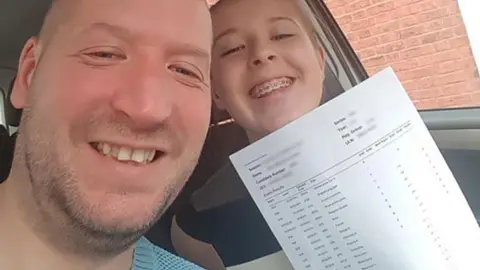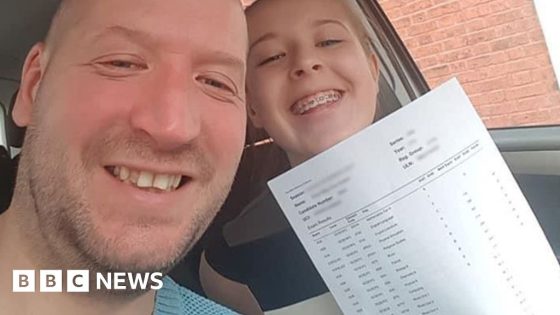 Les Sutton
Les Sutton Results day is nearly here for A-level, BTec, T-level and GCSE students. It can be stressful, so how can parents and carers help their teenagers through it?
“I am quite impulsive, I say and do the wrong thing a lot of the time, we’ve had arguments, we’ve had shouting.”
That’s Les Sutton’s very honest assessment of what happened when his daughters, Anna and Emily, were doing their A-levels.
Les, who’s 47 and from Chorley in Lancashire, says he struggled to understand what they were going through – partly because he didn’t do A-levels or apply to university himself.
But Anna and Emily, now 23 and 20, say their dad did better than he thought.
We asked them, and an expert, for some tips on how to get through the day.
1. Be positive
Anna was really nervous ahead of her results coming out, and spent the morning in front of her computer waiting for them to drop.
Once they had, Les drove her to college to collect them in person, which Anna says made her feel really supported.
Les says he had decided that no matter what Anna’s grades were, he was going to tell her “well done”.
“If they get top marks or bottom marks it’s not going to change anything. It is what it is and you’ve got to be positive,” he says.
Stevie Goulding, senior manager for parents and carers services at the charity, Young Minds, says this kind of language is key – as is asking your child how they are feeling, and being careful not to invalidate those feelings.
Stevie says this means instead of saying “don’t worry”, say something like: “You’ve told me you’re worried and that’s OK, what can I do to help?”
To keep conversations open she says you should never let your kids hear even the tiniest hint of disappointment in your voice, including when speaking to others on the phone or in family WhatsApp groups.
“Your words really matter,” Stevie adds.
Anna says her dad’s positivity was invaluable.
“It was nice to have that support of someone who doesn’t really care about the results, just cares about you and cares about your happiness.”
2. Make a plan, then rip it up
 Emily Sutton
Emily Sutton Planning a treat or chill-out time before and after results is something Les, Anna, Emily and Stevie all say is important.
Les recommends offering a family trip out to the cinema or bowling the night before, to help ease the stress.
Emily says she planned a night out on results night with her friends and her sister, so she had something to look forward to.
“We booked it so we could either celebrate or blow off some steam – a good night out to forget the stress,” she says.
Stevie says it’s important to have a conversation and find out what your teenager would like you to do before, on and after results day. She says make plans, but be flexible, as things can change very quickly.
Emily wasn’t sure what she wanted to do, but as the day unfolded she realised – despite how supportive her parents had been – she didn’t want them around.
“I definitely needed time to process alone,” she says.
When she logged in at home and saw her grades weren’t quite what she had hoped for, she decided not to head into college to pick them up. She says she was worried that having to share her live reaction in front of everyone would have added to the stress.
Stevie says what’s really important is that parents are there for moral support, without crowding.
3. Have a comms plan
 Emily Sutton
Emily Sutton Chatting with friends and family proved difficult for both Anna and Emily on results day.
Anna says her friends kept going over what had happened in the exams themselves, while Emily felt pressured to share details of her results.
“It made me feel inferior,” she says.
“We simply should have said ‘I got what I needed for university’ or ‘I didn’t’.”
Emily also says she got phone calls from “multiple family members at nine on the dot”, which she found really frustrating.
“I wish they had waited an hour or so and let me ring them instead,” she adds.
Stevie says it’s helpful to remind your kids they don’t have to engage with anyone until they are ready.
You can also ask family members to only get in touch with them once you say it is OK.
4. Educate yourself
Anna narrowly missed out on the grades she needed to meet the offer Salford University had given her to study biomedical science, but admissions staff decided to show leniency and accepted her anyway.
She has now graduated and is about to start a postgraduate course at Sheffield University. She says parents need to make sure their teenagers know that things can work out fine, even if your results are not exactly what you had hoped for.
Emily got a place to study criminology at Salford University, but a few months in she realised the course wasn’t for her and decided to leave.
Les says he wishes he had known more so he could have offered more advice and had more input when his daughters were making these kinds of big decisions.
“I hadn’t educated myself enough to be able to give them enough knowledge about what the other options were,” he says.
He urges parents to find out as much as possible about what’s available, whether that’s knowing what apprenticeships they can apply for, how clearing works, how you can appeal results or just giving yourself the confidence to take your time deciding what to do next.
Stevie says do your best to remove any pressure to dive into decisions your kids are not ready to make, and support the ones they are.
5. Expect stress to spill over
With all the preparation in the world, it is still possible that you’ll put your foot in it and say the wrong thing.
Les says because Anna and Emily live part of the time with him and part of the time with their mum, it wasn’t always clear where they were up to in their studies and this caused some tension – as did discussions about money when it came to planning for university.
He says when this happens and you end up arguing and shouting at each other, the best thing to do is to walk away from the situation. Make a cup of tea and give yourself five minutes to talk it through with someone else if you can.
Then go back, say sorry and if you were wrong, say so.
Stevie says these things will happen as it’s a stressful time for families. She advises parents to “own up and apologise and try to learn from it for next time”.
Source Agencies




